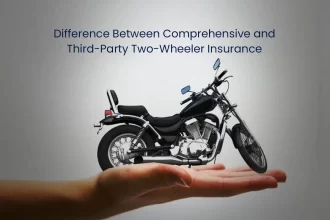What is comprehensive insurance? let’s explore
You may have heard that third-party vehicle insurance is mandatory in India. Third-party insurance ensures that if you get in an accident and are found to be at fault, your insurance company will pay for the damages that you have caused. But is third-party insurance enough? Insurance companies recommend that you get comprehensive insurance instead. Would you like to know what is comprehensive insurance?
Comprehensive insurance is a type of auto insurance that provides extensive coverage beyond the basics, protecting you from a wide range of risks and hazards. It goes beyond liability insurance, which only covers damages you cause to others. Comprehensive insurance helps cover damage to your own vehicle and also protects your car from theft, vandalism, natural disasters, fire, floods, damage caused by accidents, and more.
This type of coverage is ideal for those looking to safeguard their vehicles from unpredictable and uncontrollable events. With comprehensive insurance, policyholders can have peace of mind knowing that even if something unexpected happens, their insurance can help pay for repairs or replacement.
How Does Comprehensive Coverage Insurance Work?

Comprehensive insurance offers both third-party insurance and own-damage insurance benefits, making it one of the most robust auto insurance options available. While comprehensive insurance is not mandatory in all regions, it’s commonly required by lenders when financing a vehicle.
When an insured event takes place, you can file a claim with your insurance provider. The insurance company then evaluates the damage and determines the payout based on the policy terms, minus any deductibles you are responsible for.
For example, if a tree falls on your parked Maruti Suzuki Ignis during a storm, the damage would be covered under comprehensive insurance. After reporting the incident to your insurance provider and providing necessary documentation (such as photos or police reports), they will review the claim and determine the compensation amount based on the vehicle’s value and the cost of repairs.
The policyholder usually has to pay a deductible, which is the amount you agree to pay out of pocket before your insurance covers the rest. For instance, if your deductible is₹500 and the repair costs are ₹2,000, your insurer will cover ₹1,500.
Comprehensive insurance is typically sold as part of a full-coverage auto insurance plan, which may include liability, collision, and uninsured motorist protection. Policyholders can choose to customize their coverage to suit their specific needs.
Example of What Is Comprehensive Insurance and How It Works

Let’s consider a scenario where someone owns a car and parks it in their driveway every night. One evening, a severe hailstorm damages the car, resulting in dents all over the vehicle. The owner has comprehensive car insurance with a ₹1,000 deductible. The total repair cost is estimated to be ₹5,000.
- The policyholder reports the damage to their insurance company.
- An adjuster evaluates the damage and confirms it was caused by a covered event (hail).
- The repair shop provides an estimate, and the insurance company agrees to pay ₹4,000 (the repair cost minus the deductible).
- The policyholder is responsible for the ₹1,000 deductible, and the insurance covers the remaining balance.
This is a straightforward example of how comprehensive insurance protects car owners from costly repairs resulting from natural disasters or unforeseen events.
Also read: The Best Honda Bikes For Top Mileage
What Does Comprehensive Insurance Cover?
Auto comprehensive insurance covers various damages and losses that may or may not be directly related to vehicle collisions. It fills in gaps where basic liability or own damage coverage falls short, making it essential for full protection.
Below is a list of what comprehensive insurance is likely to cover:
- Third Party Damage: If you get into an accident, comprehensive insurance will pay for the damages to the life and property that have been caused to any third parties.
- Own Damage: In case of an accident, comprehensive insurance will cover the cost of repairs or replacement of your own vehicle as well.
- Theft: If your vehicle is stolen, comprehensive insurance will cover the replacement or repair costs. It may also cover damages if the vehicle is recovered but vandalized or damaged during the theft.
- Vandalism: This includes deliberate damage to your vehicle, such as graffiti, broken windows, or slashed tires.
- Natural Disasters: Events like hurricanes, floods, tornadoes, earthquakes, and wildfires can cause significant damage to your car. Comprehensive insurance provides coverage for repairs or replacement in these cases.
- Falling Objects: Whether a tree limb falls on your car or debris from a construction site damages your vehicle, comprehensive insurance helps cover the cost of repairs.
- Fire: Damage caused by fires, whether from external sources or an engine fire, is typically covered under comprehensive insurance.
- Animal Damage: If an animal, such as a deer, strikes your vehicle, or if smaller animals chew on electrical wiring, comprehensive insurance can help with the costs of repair.
- Glass Breakage: If your windshield, windows, or other glass parts of the vehicle are damaged, comprehensive insurance typically covers repair or replacement.
- Weather-related Damage: Comprehensive insurance covers damage from extreme weather, such as hail, flooding, lightning, or windstorms.
Advantages and Disadvantages of Comprehensive Insurance
Now that you know what is comprehensive insurance, it’s time to take a look at its advantages and disadvantages.
Advantages of Comprehensive Insurance:
- Single Policy: While third-party insurance is required by law, it doesn’t cover damages to your own vehicle. So you would have to buy an Own Damage policy along with your third-party policy in order to get full protection. With a comprehensive insurance plan, you can get both covers in a single policy.
- Broad Protection: Comprehensive insurance covers a wide variety of non-collision-related damages, making it ideal for individuals living in areas prone to natural disasters or high crime rates.
- Peace of Mind: Knowing that you’re covered against unpredictable events such as theft or weather damage can be reassuring, especially if you own a valuable or new vehicle.
- Mandatory for Financed Vehicles: Many lenders require comprehensive insurance as part of a full coverage policy when you’re financing a car, so it protects both you and the lender.
- Coverage for Natural Disasters: If you live in an area susceptible to events like floods or wildfires, comprehensive insurance ensures you won’t have to cover repair or replacement costs on your own.
- Value Preservation: In case of a total loss (where the vehicle is damaged beyond repair), comprehensive insurance can compensate you for the actual cash value of the vehicle, helping to protect your investment.
Disadvantages of Comprehensive Insurance
- Higher Premiums: Comprehensive insurance is typically more expensive than basic liability or own damage coverage because it covers more risks. Policyholders need to weigh whether the additional cost is worth the potential benefit.
- Deductibles: Comprehensive insurance policies usually come with a deductible, which you must pay before the insurer covers the rest. This can be a financial burden if the deductible is high.
- Limited Coverage for Older Vehicles: For older cars with lower market values, the cost of comprehensive insurance may not be justified, as the premium could approach the vehicle’s value.
- Not a Legal Requirement: Unlike liability insurance, which is required in most states or countries, comprehensive insurance is optional. Some people may choose to forgo it, especially if they own a lower-value car.
- Potential for Over-Insurance: If you are overinsured (paying for coverage that exceeds the value of your vehicle), you could end up spending more on premiums than the car is worth in the event of a total loss.
Also read: Hero’s Most Attractive Adventure Bike
Benefits of Comprehensive Insurance
Comprehensive insurance offers numerous benefits that can make it a worthwhile investment for car owners. So, what is comprehensive insurance beneficial for? Here are some of the most notable advantages:
- Extensive Coverage: As the name suggests, comprehensive insurance provides coverage for a wide range of risks that other policies might not. This makes it one of the most complete auto insurance options available.
- Collision Damages: Comprehensive insurance protects you from both collision- and non-collision-related damages, such as theft, vandalism, and weather-related events.
- Asset Protection: Comprehensive insurance protects the value of your vehicle, ensuring that you’re compensated for damages or loss, even in unpredictable circumstances.
- Customizable Coverage: Many insurers allow policyholders to customize their coverage, so you can select a deductible and policy limits that suit your needs and budget.
- Required by Lenders: If you’re financing a car, comprehensive insurance may be required. Having it protects not only your investment but also the lender’s interest in the vehicle.
- Convenience: Comprehensive insurance is typically bundled with other auto insurance coverages, meaning you only have to manage one policy for multiple types of protection.
Is Comprehensive Insurance Worth It?
Determining whether comprehensive insurance is worthwhile depends on several factors. For most people, the protection it offers against theft, natural disasters, and accidental damages makes it a valuable part of an auto insurance policy. However, it may not be necessary for everyone.
If your car is older and has a low market value, you might find that the cost of comprehensive insurance outweighs the potential payout. In these cases, you may prefer to drop comprehensive coverage and rely on liability and own damage insurance instead. However, if your car is new, expensive, or financed, comprehensive insurance is generally worth the investment.
For people living in areas prone to extreme weather, high crime rates, or natural disasters, comprehensive insurance provides crucial coverage that would otherwise be unavailable with a basic policy.
Also read: The Top 5 BMW Bikes in India
Top Reasons to Buy a Comprehensive Insurance Policy
- Protection Against Theft: Comprehensive insurance ensures you’re covered if your vehicle is stolen, which is especially important in areas with high crime rates.
- Weather Protection: If you live in a region that experiences frequent storms, floods, or other weather-related events, comprehensive insurance can cover damages caused by these forces.
- Coverage for Vandalism: Having coverage against vandalism is essential if you park in public or unsecured areas frequently. Comprehensive insurance will cover repair costs if your car is damaged.
- Lender Requirement: If you’re financing your car, comprehensive insurance is often a requirement to protect the lender’s interest in the vehicle.
- Peace of Mind: Comprehensive insurance provides a safety net for various unexpected events, giving you peace of mind in case anything happens to your vehicle.
- Preservation of Vehicle Value: Comprehensive insurance helps protect the value of your car by covering repair or replacement costs, ensuring that you don’t suffer significant financial losses due to unforeseen events.
- Protection Against Animal Damage: If you live in rural areas or places where wildlife frequently crosses roads, comprehensive insurance will cover damages resulting from animal accidents.
- Affordability of Repairs: Depending on the event and damage, repairs can be costly. Comprehensive insurance saves you from significant out-of-pocket expenses by covering repair or replacement costs.
- Essential for High-Value Vehicles: If you own a luxury or high-value vehicle, comprehensive insurance ensures that you’re financially protected from a wide range of non-collision events.
- Customizable Coverage: Comprehensive insurance policies are often flexible, allowing you to adjust your deductible and policy limits to fit your budget and coverage needs.
Conclusion
Comprehensive insurance provides robust protection for your vehicle from collision and non-collision-related damages, making it an essential part of a full auto insurance plan. While not legally required, comprehensive coverage is a valuable investment for most vehicle owners, offering peace of mind and financial protection.
Whether your car is at risk of theft, weather damage, or vandalism, comprehensive insurance ensures that you’re prepared for the unexpected. By understanding what is comprehensive insurance, how it works and the benefits it offers, you can make an informed decision about whether it’s right for you.
Learn about comprehensive insurance, bike insurance, and the financial aspects of car and bike ownership with blogs from AUTOLIVENEWS. Keep reading to know how to check bike insurance, how to renew expired insurance, and more!
Leave a comment if this blog helped you understand ‘What is comprehensive insurance?’ Let us know what you’d like to read about next!
Frequently Asked Questions (FAQs)
What are the main types of automobile insurance available?
In India, you can choose to get third-party insurance, own damage insurance, or comprehensive insurance.
What benefits does comprehensive insurance offer?
Comprehensive insurance offers third-party compensation, own damage compensation, as well as compensation for repairs or replacement against theft and natural disasters.
What is the difference between third-party and own damage insurance?
Third-party insurance provides compensation to third parties in case of an accident. Own damage compensates the damage to your own vehicle in case of an accident.
Does comprehensive insurance compensate collision related damages?
Yes, in India, comprehensive insurance covers damage caused by both collision- and non-collision-related events.
Which auto insurance is mandatory in India?
Third-party auto insurance is legally mandatory in India.















